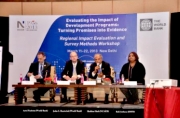NCAER and the World Bank organized a two-week international high-level workshop, titled “Evaluating the Impact of Development Programs: Turning Promises into Evidence” in New Delhi. NCAER and the World Bank collaborated to offer this unique training workshop for the first time in India. The workshop trained more than 100 participants from around 14 countries, many from India, on how to answer questions such as:
Do government development projects and schemes have the desirable impact?
How can that impact be
measured in robust ways?
Can the impact be attributed to the specific government project or to other factors?
How to collect good survey data necessary to answer such questions?
The workshop familiarized participants with cutting-edge methods for identifying and measuring the impact of development schemes and for survey data collection. A unique aspect of the programme was the hands-on training that participant teams received to develop their own evaluation designs for specific government schemes. With the largest contingent from South Asia and India, the participants represented a wide spectrum of institutions interested in evaluation, including central and state governments, think tanks and research institutes, private firms, and international multilateral and bilateral agencies.
The plenary session in the first week of the workshop had special lectures by Mr. Nandan Nilekani, President, NCAER Governing Body and Chairman of UIDAI on “Aadhaar: Direct Benefit Transfers in India and their Impact” and by Dr Abhijit Banerjee, Ford Foundation International Professor of Economics at the Massachusetts Institute of Technology on “Evaluating Impact: From Promise to Evidence”
The second week had Dr Abhijit Sen, Member, Planning Commission talking on “Indian Evaluation Experience” and Dr Rukmini Bannerji, Director, Pratham speaking to participants on “Evidence to Action: Learnings from ASER in India.”
The workshop offered policymakers, researchers, and government officers a unique mix of conceptual and practical training where they worked together as project teams with world-renowned experts in the field. Rated as one of the best skill-building events in evaluation by previous participants from the same workshop around the world, the two-week workshop included sessions on designing evaluations, building results chains, interpreting results, constructing survey samples, developing survey questionnaires, and managing field data collection. These were taught through a mix of lectures, small and large group discussions, and hands-on application of practical skills in impact evaluation, to participants. A unique aspect of the workshop is its dual-track approach that will cater to both policymakers and technical researchers in separate specially designed sessions. The workshop had participants from Afghanistan, Bangladesh, India, Nepal, Pakistan, Chile, Egypt, Ethiopia, Papua New Guinea, Romania, Tajikistan, the United States, and Vietnam. The workshop ended with participants receiving certificates from Dr Shekhar Shah, Director-General, NCAER and Dr Ariel Fiszbein, Chief Economist, Human Development Network, the World Bank.






